







Basic models of pumps and motors. TankNoRes Tank, i. e. constant pressure outlet, but no resistance IdFlowSource ideal flow source IdFlowSourceExtCommand ideal flow source with externally commanded flow rate IdConPump ideal pump with constant displacement IdVarPump ideal pump with variable displacement IdConMot ideal motor with constant displacement IdVarMot ideal motor with variable displacement DieselNoStates Diesel motor with speed controller but no inertia AsynchronNoStates electrical asynchron motor without inertia Release Notes: -------------- 1999 - 10 - 13: coded
 HyLibLight.Pumps.Basic.DieselNoStates
HyLibLight.Pumps.Basic.DieselNoStates
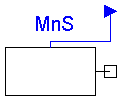
Diesel engine with speed controller but no inertia
The model uses a static characteristic curve of maximum torque as a
function of speed. This relation is given by a polynomial.
There is a simple speed controller implemented. The reference signal
for this controller is given by
inPort.signal = 0 => w_min
inPort.signal = 1 => w_max
This simple model doesn't describe the startup of a Diesel engine.
(Set initial conditions for coupled inertia between w_min and w_max.)
Release Notes:
--------------
2000 - 1 - 28: tested
| Name | Default | Description |
|---|---|---|
| wmin | 75 | minimum angular velocity [rad/s] |
| wmax | 240 | maximum angular velocity [rad/s] |
| diesel3 | 9.0212e-6 | |
| diesel2 | -7.5153e-3 | |
| diesel1 | 1.5939 | |
| diesel0 | 7.5022e+1 | |
| kdiesel | 10 | gain of speed controller, Nm / (rad/sec) |
model DieselNoStates "Diesel engine with speed controller"
parameter Modelica.SIunits.AngularVelocity wmin=75
"minimum angular velocity";
parameter Modelica.SIunits.AngularVelocity wmax=240
"maximum angular velocity";
parameter Real diesel3=9.0212e-6;
parameter Real diesel2=-7.5153e-3;
parameter Real diesel1=1.5939;
parameter Real diesel0=7.5022e+1;
parameter Real kdiesel=10
"gain of speed controller, Nm / (rad/sec)";
Modelica.SIunits.AngularVelocity wRefu;
Modelica.SIunits.AngularVelocity wRef;
Modelica.SIunits.AngularVelocity w
"absolute angular velocity of component";
Modelica.SIunits.Torque taumax;
Modelica.SIunits.Torque tauref;
Modelica.Mechanics.Rotational.Interfaces.Flange_b flange_b
"(right) driven flange (flange axis directed OUT OF cut plane)";
Modelica.Blocks.Interfaces.InPort inPort(final n=1)
"Connector of input signal used as commanded speed";
equation
w = der(flange_b.phi);
wRefu = wmin + (wmax - wmin)*inPort.signal[1];
/*unlimited command signal*/
wRef = if (wRefu < wmin) then wmin else if (wRefu > wmax) then wmax
else wRefu;
/*limited command signal*/
tauref = (wRef - w)*kdiesel;
taumax = diesel0 + diesel1*w + diesel2*w*w + diesel3*w*w*w;
-flange_b.tau = if (w < 0.5*wmin) then -5*w else if (tauref > taumax)
then taumax else if (tauref < -0.3*taumax) then -0.3*taumax else tauref
;
end DieselNoStates;
 HyLibLight.Pumps.Basic.IdVarPump
HyLibLight.Pumps.Basic.IdVarPump
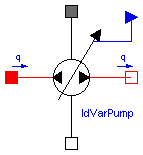
Ideal pump with variable displacement
Flow of an ideal pump with variable displacement
The flow rate is given by:
q = Dpump * w * inPort.signal[1] / (2 * pi)
if the inlet pressure is higher than the atmospheric pressure,
otherwise the delivered flow becomes smaller.
q: delivered flow rate in m^3/s
Dpump: displacement per revolution in m^3
w: angular velocity in rad/s
inPort.signal[1]: command signal for relative displacement:
+1 => max. flow from A -> B (for w > 0)
0 => q = 0
-1 => max. flow from B -> A (for w > 0)
Release Notes:
--------------
2000 - 2 - 1: tested
| Name | Default | Description |
|---|---|---|
| Dpump | 0.1e-3 | displacement per revolution [m3] |
model IdVarPump "Ideal pump with variable displacement."
extends HyLibLight.Interfaces.RotComp;
parameter Modelica.SIunits.Volume Dpump=0.1e-3
"displacement per revolution";
Real sig;
Real factor;
Modelica.Blocks.Interfaces.InPort inPort(final n=1)
"Connector of input signal used as relative displacement volume";
equation
sig = if inPort.signal[1] < -1 then -1 else if inPort.signal[1] > 1
then 1 else inPort.signal[1];
factor = if (sig*w > 0 and port_A.p < pvapour) then 0 else if (sig*w
> 0 and port_A.p < 0) then (1 - (1 + (port_A.p - pvapour)/pvapour)^2
) else if (sig*w < 0 and port_B.p < pvapour) then 0 else if (sig*w
< 0 and port_B.p < 0) then (1 - (1 + (port_B.p - pvapour)/pvapour)^2
) else 1;
q = Dpump*w*sig/(2*Modelica.Constants.pi)*factor;
-Dpump*sig*dp*factor/(2*Modelica.Constants.pi) = flange_a.tau + flange_b.tau
;
end IdVarPump;
 HyLibLight.Pumps.Basic.IdConPump
HyLibLight.Pumps.Basic.IdConPump
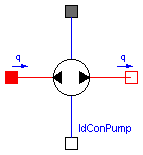
Ideal pump with constant displacement The flow rate is given by: q = Dpump * w / (2 * pi) if the inlet pressure is higher than the atmospheric pressure, otherwise the delivered flow becomes smaller. q: delivered flow rate in m^3/s Dpump: displacement per revolution in m^3 w: angular velocity in rad/s Release Notes: -------------- 1999 - 10 - 26: tested
| Name | Default | Description |
|---|---|---|
| Dpump | 0.1e-3 | displacement per revolution [m3] |
model IdConPump "Ideal pump with constant displacement."
extends HyLibLight.Interfaces.RotComp;
parameter Modelica.SIunits.Volume Dpump=0.1e-3
"displacement per revolution";
Real factor;
equation
factor = if (w > 0 and port_A.p < pvapour) then 0 else if (w > 0
and port_A.p < 0) then (1 - (1 + (port_A.p - pvapour)/pvapour)^2) else
if (w < 0 and port_B.p < pvapour) then 0 else if (w < 0 and port_B
.p < 0) then (1 - (1 + (port_B.p - pvapour)/pvapour)^2) else 1;
q = Dpump*w/(2*Modelica.Constants.pi)*factor;
-Dpump*dp*factor/(2*Modelica.Constants.pi) = flange_a.tau + flange_b.tau;
end IdConPump;
 HyLibLight.Pumps.Basic.TankNoRes
HyLibLight.Pumps.Basic.TankNoRes
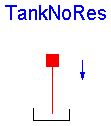
Tank with a preload pressure against atmosphere. A preload pressure of 0 Pa means that the tank has atmospheric pressure. A preload pressure of 1 MPa means that the tank has an absolute pressure of 1,1 Mpa. See also: Tank Tank with preload and a laminar resistance (line) Release Notes: -------------- 1999 - 10 - 18: tested
| Name | Default | Description |
|---|---|---|
| ppreload | 0.0e5 | preload pressure [Pa] |
model TankNoRes "Tank with preload."
extends HyLibLight.Interfaces.OnePortCompInput90;
parameter Modelica.SIunits.Pressure ppreload=0.0e5
"preload pressure";
equation
port_A.p = ppreload;
end TankNoRes;
 HyLibLight.Pumps.Basic.IdConMot
HyLibLight.Pumps.Basic.IdConMot
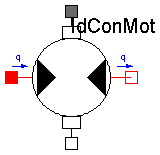
Ideal motor with constant displacement The flow rate q is given by q = Dmotor * w / (2 * pi) if the pressure at the inlet port is higher than the atmoshperic pressure, otherwise there is a flow reduction. q: flow rate in m^3/s Dmotor: displacement in m^3 / revolution w: angular velocity in rad/s The torque tau is given by: tau = Dmotor * (pA - pB)/(2*pi) Release Notes: -------------- 1999 - 10 - 26: tested
| Name | Default | Description |
|---|---|---|
| Dmotor | 0.1e-3 | displacement per revolution [m3] |
model IdConMot "Ideal constant displacement motor."
extends HyLibLight.Interfaces.RotComp;
parameter Modelica.SIunits.Volume Dmotor=0.1e-3
"displacement per revolution";
Real factor;
equation
factor = if (w > 0 and port_A.p < pvapour) then 0 else if (w > 0
and port_A.p < 0) then (1 - (1 + (port_A.p - pvapour)/pvapour)^2) else
if (w < 0 and port_B.p < pvapour) then 0 else if (w < 0 and port_B
.p < 0) then (1 - (1 + (port_B.p - pvapour)/pvapour)^2) else 1;
q = Dmotor*w*factor/(2*Modelica.Constants.pi);
-dp*Dmotor*factor/(2*Modelica.Constants.pi) = flange_a.tau + flange_b.tau;
end IdConMot;
 HyLibLight.Pumps.Basic.IdFlowSource
HyLibLight.Pumps.Basic.IdFlowSource
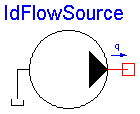
Flow of an ideal flow source The flow rate is given by: q = qbias + qamp * sin(qfreq * 2 * pi * time + qphase) The flow can become negative. The pressure is a result of the flow and the following resistances. Release Notes: -------------- 1999 - 10 - 18: tested
| Name | Default | Description |
|---|---|---|
| qbias | 1e-3 | bias of flow [m3/s] |
| qamp | 0 | amplitude of sinusoidal flow [m3/s] |
| qfreq | 0 | frequency of sinusoidal flow [Hz] |
| qphase | 0 | rad; phase shift |
model IdFlowSource "Ideal flow source."
extends HyLibLight.Interfaces.OnePortCompOutput;
parameter Modelica.SIunits.VolumeFlowRate qbias=1e-3
"bias of flow";
parameter Modelica.SIunits.VolumeFlowRate qamp=0
"amplitude of sinusoidal flow";
parameter Modelica.SIunits.Frequency qfreq=0
"frequency of sinusoidal flow";
parameter Real qphase=0 "rad; phase shift";
equation
-port_B.q = qbias + qamp*Modelica.Math.sin(qfreq*6.28319*time + qphase);
end IdFlowSource;
 HyLibLight.Pumps.Basic.IdFlowSourceExtCommand
HyLibLight.Pumps.Basic.IdFlowSourceExtCommand
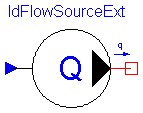
Ideal flow source with externally commanded flow rate. The flow rate is given by inPort.signal in m^3/s.The flow rate can become negative. The pressure is a result of the flow rate and the following resistances. Release Notes: -------------- 2000 - 1 - 24: tested
model IdFlowSourceExtCommand
"Ideal flow source with externally commanded flow rate."
extends HyLibLight.Interfaces.OnePortCompOutput;
Modelica.Blocks.Interfaces.InPort inPort(final n=1)
"Connector of input signal used as flow rate";
equation
-port_B.q = inPort.signal[1];
end IdFlowSourceExtCommand;
 HyLibLight.Pumps.Basic.IdVarMot
HyLibLight.Pumps.Basic.IdVarMot
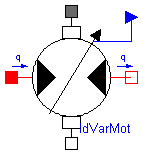
Ideal motor with variable displacement.
The flow rate q is given by:
q = Dmotor * inPort.signal[1] * w / (2 * pi)
if the pressure at the inlet port is higher than the atmoshperic
pressure, otherwise there is a flow reduction.
q: flow rate in m^3/s
Dmotor: displacement in m^3 / revolution
w: angular velocity in rad/s
inPort.signal[1]: command signal for relative displacement
The torque tau is given by:
tau = Dmotor * inPort.signal[1] * (pA - pB)/(2*pi)
inPort.signal[1]: command signal for relative displacement:
+1 => max. flow from A -> B (for omega > 0)
0 => q = 0
-1 => max. flow from B -> A (for omega > 0)
Release Notes:
--------------
2000 - 1 - 27: tested
| Name | Default | Description |
|---|---|---|
| Dmotor | 0.1e-3 | max. displacement per revolution [m3] |
model IdVarMot "Ideal variable displacement motor."
extends HyLibLight.Interfaces.RotComp;
parameter Modelica.SIunits.Volume Dmotor=0.1e-3
"max. displacement per revolution";
Real factor;
Real sig;
Modelica.Blocks.Interfaces.InPort inPort(final n=1)
"Connector of input signal used as relative displacement volume";
equation
sig = if inPort.signal[1] < -1 then -1 else if inPort.signal[1] > 1
then 1 else inPort.signal[1];
factor = if (sig*w > 0 and port_A.p < pvapour) then 0 else if (sig*w
> 0 and port_A.p < 0) then (1 - (1 + (port_A.p - pvapour)/pvapour)^2
) else if (sig*w < 0 and port_B.p < pvapour) then 0 else if (sig*w
< 0 and port_B.p < 0) then (1 - (1 + (port_B.p - pvapour)/pvapour)^2
) else 1;
q = Dmotor*w*sig/(2*Modelica.Constants.pi)*factor;
-dp*Dmotor*factor*sig/(2*Modelica.Constants.pi) = flange_a.tau + flange_b.
tau;
end IdVarMot;